Sonja Elwood

Bush regeneration in Pittwater is done on a massive scale in every suburb by small bands of dedicated volunteers. We can see people sweating hard in shimmering heat hazed days pulling out choking thorny lantana while pushing in ecualpyt saplings. This is work that has gone on for decades and is turning what was once degenerated back into 'regenerated' and restoring areas close to their original bush landscapes.
This work is helped along by qualified Pittwater Council bush regenerators who work alongside the volunteers, helping them identify what needs to go, and what can be planted to replace it as it originally was in this specific area or areas worked in.
Nursing a sick or injured native animal back to health conjures up visions of their bounding back home into sunlit bush, a little twirl of legs or
tail in mid-jig salutation. What those who don't do this don’t see are long nights fretting over a tiny
creature that won’t eat or stay warm; we don’t see the sad doe eyes, frightened
and confused.
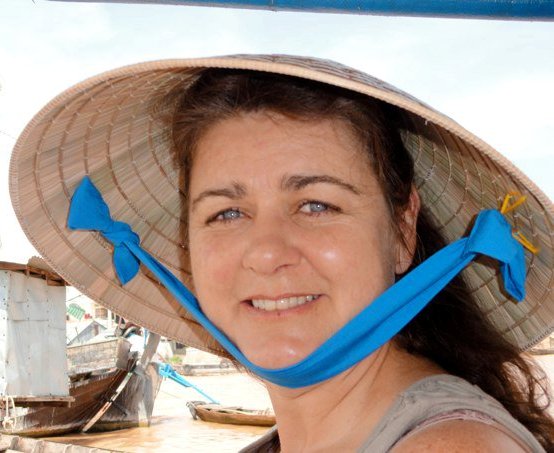
There is something very special about those who give their time, energy to wrest the bush back from the brink and regenerate it back to its original and glorious balance. Equally unique are those who tend native animals that are injured by others until they may be released back into their habitats. The level of dedication, sleep deprivation experienced and education required denotes a passion and focus that must be a part of that person’s essence and nature.
A Fauna Expert and Environmental Education
Officer with Pittwater Council, a finalist who received a certificate of
appreciation in the 2012 Pittwater Volunteer Award for 20+ years service in May
this year, a lady who gives up weekends to take others on informative community
Walk and Talks and is always smiling at every Bushcare Regeneration
morning is bubbly Sonja Elwood. Gentle, kind, steady and passionately serious
about her works, this lady puts ‘lifelong learning’ and celebration of our
natural garden and its creatures into action. Where does
all this Spring from?
I was born in Dunedin (South Island of NZ) but moved to Auckland (North Island) of New Zealand at around two years of age where I was raised by my mother and grandparents. My grandmother had an enormous influence on my life and was a truly incredible lady. An only child, hyperactive and very sensitive I was the bane of my mother and grandmother's life - constant questions, very busy and born with a love of all things natural. My grandfather was a market gardener so I was very fortunate to be raised on organic foods straight from the garden and spent hours wandering the gardens and orchards. My grandmother bought only the minimum from shops preferring to make her own clothes and household necessities. She baked a variety of goodies weekly and preserved every type of fruit and veggies annually. She also made every type of jam with fruits picked from our orchards. Even today I do not buy jam .... it just doesn’t make the grade.... lol.
My grandparents also owned lands on the west coast at Piha, a wild black sand beach surrounded by bushland and dunes where a great deal of my childhood was spent. My grandmother’s family have owned lands in the area since European settlement and the area has meant a great deal to all of us. I realise looking back I knew that land well ... the tracks, trails, creeks, birds. I still return there every year when I visit home and the beach and area still provide a deep feeling of comfort and home. It is a huge untamed landscape and still, thank goodness, largely protected.
My family and ancestors on both sides of my family are compassionate, kind and gentle people .... it seems to be genetic. To my mother/grandmother’s horror when a toddler I would bring dead animals home that I found (birds or hedgehogs) and put them into the hot water cupboard in the belief if I could just warm them up they may come back to life. I desperately tried to raise chicks on several occasions in my childhood with no success and upon reflection can still feel the sadness of failure.
Of great impact on me were two primary excursions in my first couple of years at school - one to a battery farm where chickens were kept in an enormous shed in cages for egg production. I can still recall this - the images, the smell, the filth, the lack of freedom........ were burnt into my memory - I was absolutely mortified and felt terribly worried and sad for these animals. I somehow felt there was somehow terribly wrong. The second excursion I remember vividly was to a pine plantation and mill where we were taken for a walk through a mature pine forest. Again my childish impression was of a monoculture of trees on a floor of deep pine needles where no other plants grew and no sound could be heard........nothing ..... the silence was deafening and again my overwhelming feeling was horror. Even at that young age I recognised there was no life in this forest and even the trees were waiting to die.
I was a fairly bright student and upon completing high school wanted to go to Uni but to my and my family's dismay was deemed too young and refused admission. I was only 15 and due to advances in my childhood years finished school earlier than most. I bummed around for a year travelling and spent some months in the far north of the north Island where quite by chance and most fortunately I spent some months living with a very aged Maori Tohunga (a Maori medicine/spirit man). This experience introduced me to Maori culture and indigenous lifestyle. Grandpa, as I called him, (he called me his ‘blue-eyed Mokopuna’ ; grandchild) lived entirely off the land ... no running water, no power and so on ....and knew every native plant and its use. It was an amazing experience and gave me a real taste of what has been lost through European settlement and lifestyle.
Upon my return to Auckland I joined a publishing company in sales and a year later was offered a transfer/promotion to Brisbane in Australia .... which I took. Well Australia has had a profound effect on me... so much so I haven’t gone home. It took me some years to love the land (which I now adore!!). It appeared harsh and lacked colour and detail to my eyes for some time in such contrast to the colours I was used to in NZ. But it was the wildlife that got me..........I was wowed by the enormous variety of native animals.
I spent a year in Brisbane and then transferred to Sydney where in my first few months heard of a group that had just formed that rescued injured and orphaned native wildlife. They were holding their very first training course and were looking for people who might be interested in helping and their name was WIRES. I spent 12 years with WIRES and during this time learnt a lot about Sydney's beautiful wildlife and held various positions in the organisation. During this time I also completed a Diploma in Microcomputer Technology and Programming and worked for a computer company for a few years before having my beautiful son Callum.
When I returned to work I joined WIRES as an employee working in the Rescue Office and assisting the management committee. In these couple of years I also completed the Bush Regeneration Course which gave me the names of all the native plants I had been using for some years with my animals. In 1997 I founded Sydney Wildlife and began working in the Bush Regeneration industry. After a couple of years of this I enrolled at Macquarie University in a degree in Environmental Science part time.
Whilst studying I joined the Coastal Environment Centre of Pittwater Council teaching high school and primary school children about the local environment and leading community biodiversity tours and events. After completing my degree I have joined Pittwater Council full time between two departments; - Natural Environment and Education doing fauna related work and continuing with teaching and community events and with the Reserves and Recreation department doing bushland management. I am also currently half way through Master of Wildlife Conservation at Macquarie University which I am completing part-time.

View from Muogamurra Nature Reserve when on a Guided Walk earlier this year
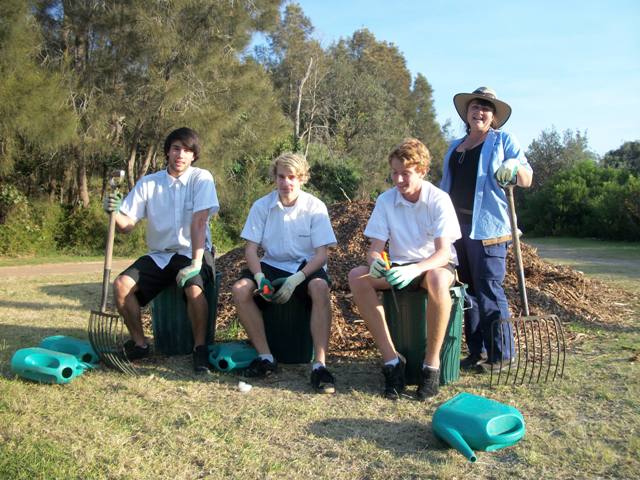
With Barrenjoey High School students doing the Community Service part of the 2012 Duke Of Edinburgh Award.
The environment and caring for wildlife is not just a job and voluntary work, - it's my life and what makes me happy. I suppose I should add I am terribly worried about the animals and the environment especially in Australia. We have an awful lot of unique biodiversity to protect.
Australia has the biggest extinction rate in mammals in the world and is right up there behind South America overall. Australia has slid backwards in the past couple of years ... logging last forests, threatened species habitats and potential world heritage sites. Mining proposed in the Kimberleys and Barrier Reef. CSG Fracking everywhere which has terrible long term environmental and health consequences to humans, wildlife, soil and water supplies. Shooting in National Parks, culling of Flying foxes, many species of which are already threatened and these animals are THE primary (if not only) pollinator of trees in both eucalpyt and rainforests, removing sustainability as a subject in the school curriculum, river health not improving and sliding backwards, climate change and sea level rise, the imminent arrival of supertrawlers in our marine environment that have nets large enough to hold 13 jumbo jets ...and so it goes on.
Our Government needs to act ... and we need to make them act. We will all suffer in the end as ecosystems start collapsing.
You formed Sydney Wildlife. When was this?
Sydney Wildlife started operation in May 1997 after three of four months of to-ing and fro-ing with the Government. We opened with about 300 people on our books.
What does Sydney Wildlife do ?
Very similar to WIRES - we are a large group of volunteers licensed by the Office of Environment and Heritage who rescue, care and release native orphaned/injured/sick wildlife in the greater Sydney Basin. The difference between us and WIRES is we have no paid staff and we operate 24 hrs/day, 7 days per week. We also do a lot of educational talks to schools, community groups etc.
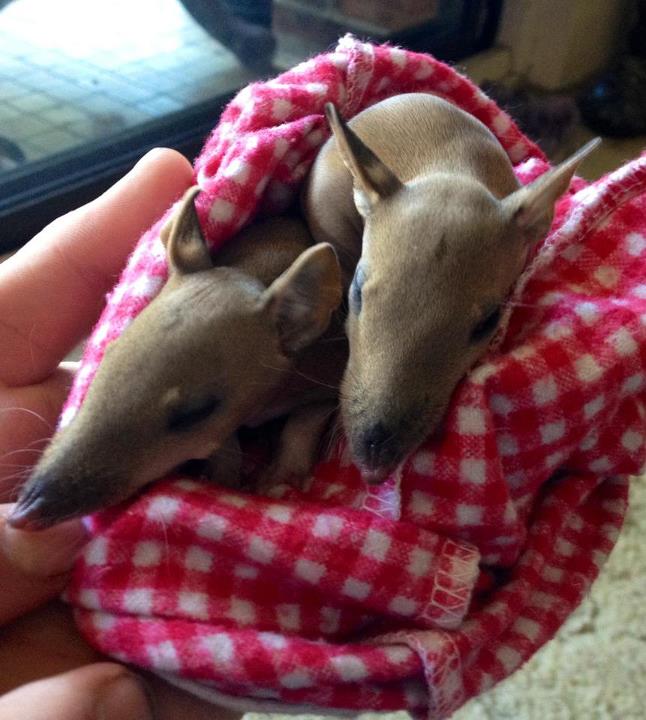
Baby Long- nosed Bandicoots - separated from their mother by a cat
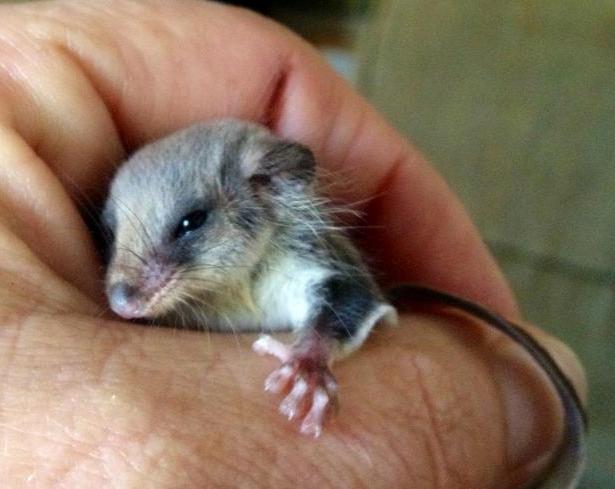
Once you have your Masters in Wildlife Conservation, what will this enable you to do ?
Maybe earn more money (laughs). I honestly don’t know where it will lead me and I am sure it wont be the end of my education. I love learning.
What is your favourite indigenous plant ?
Australia has such beautiful plants and so many of them and I haven’t even been to WA yet (which has 4-5 times as many plants as NSW)!!! I do love Angophora costata – Smooth Barked Apple trees. There bark is so lovely to the eye and they are so iconically the Northern Beaches. On the ground layer I love the heath and my favourite would be Bossiaea scolopendria - a most unremarkable looking little plant most of the year until if flowers (Aug-Oct) delightful little pea flowers directly from its stem - amazing!!
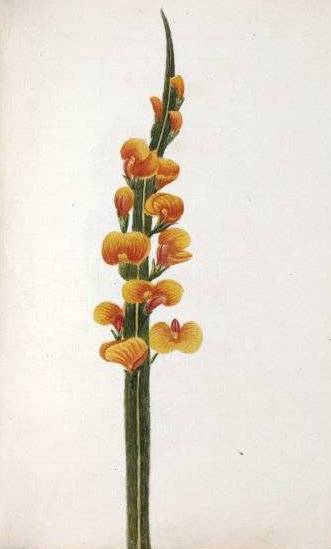
John Hunter, 1737-1821. Broom bossiaea (Bossiaea scolopendria), [between 1788 and 1790. Part of Birds & flowers of New South Wales drawn on the spot in 1788, '89 & '90 [picture] 1788-1790. nla.pic-an3149751. Courtesy National Library of Australia
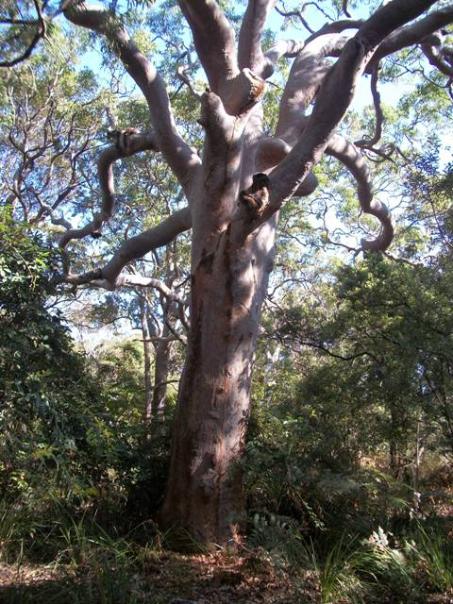
Angophora costata – Smooth Barked Apple trees
If you could be a native animal for a day what would you be, do?
Oh - all of them!! Mmmm - probably a Grey-headed Flying-fox!! I would love to feel the freedom of flying; I just adore these animals and they are so misunderstood and much maligned. They’re 4-5 times more intelligent than dogs, THE primary pollinators of our ecualpyt and rainforest canopy trees and sadly threatened with extinction. They are a delight to care for, friendly, loving, funny .... I am so afraid for them.

Gem' - released last week (March 17, 2012) - on a wing and all my prayers beautiful girl xxx
What is your favourite place/s in Pittwater and why?
Warriewood Escarpment, now called Ingleside Chase Reserve and of course Ku ring gai National Park particularly those areas of bushland that meet the sea - I am a water baby :) . Why? Because I love the animals and large pieces of bushland is where I can find them living undisturbed. I like the feeling when you are out in the bush standing perhaps on a sandstone ledge looking out over the bush to the sea that you are small and nature is much bigger than you ... Pittwater has a lot of those places, it's fantastic!
What is your 'motto for life' or a favourite phrase you try to live by?
I like the expression "I'd rather die on my feet than live on my knees"
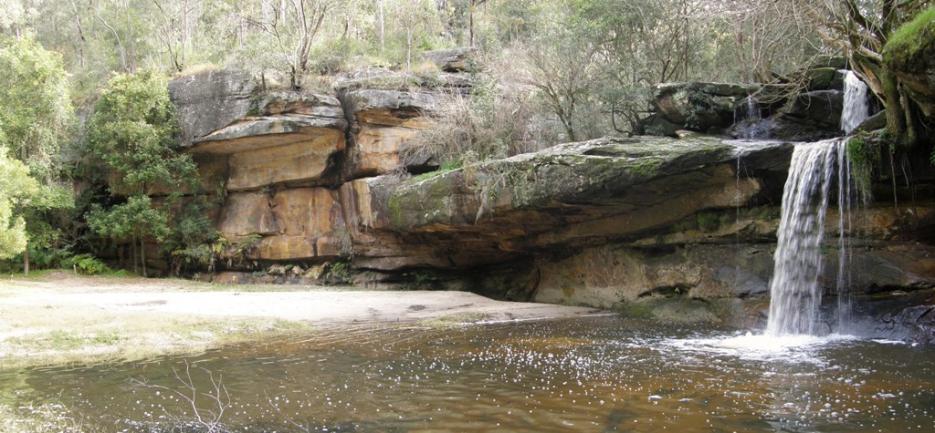
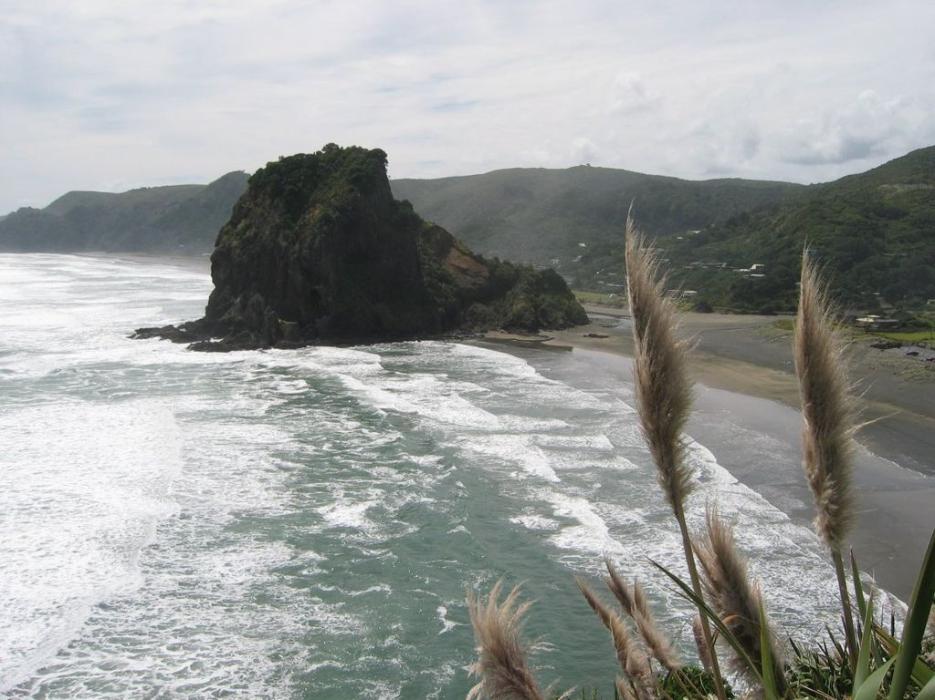
Looking across South Piha Beach to Lion Rock, Auckland, New Zealand. Photo by Avenue.